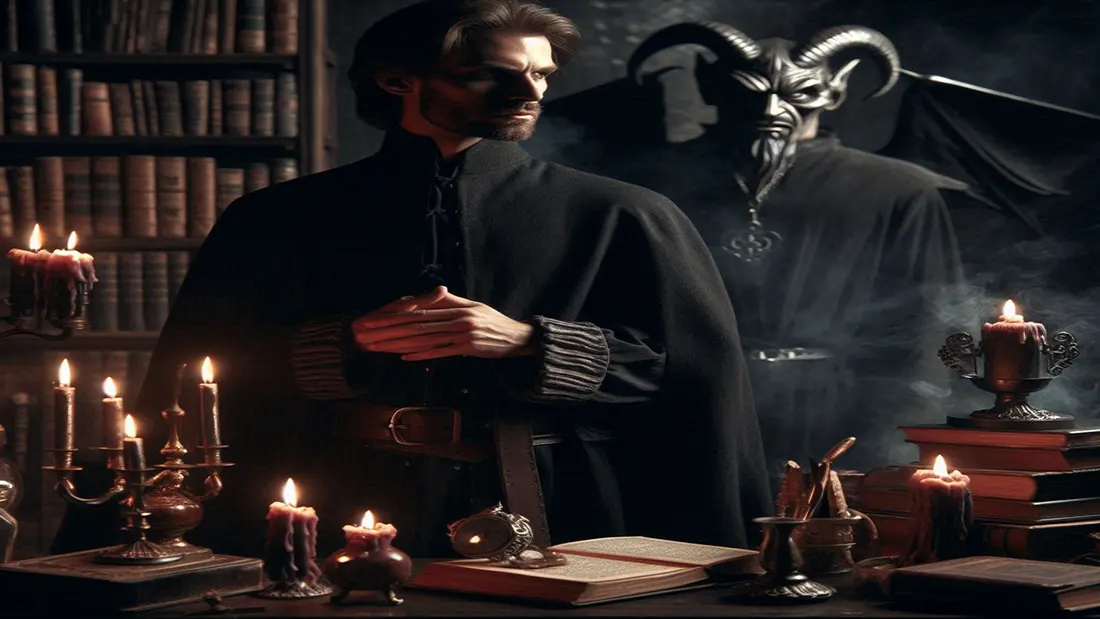Welcome to BD JOBZ PREPARATION, where we dive into the intricacies of some of the most fascinating works in literature. Today, we will explore the complex and tragic character of Doctor Faustus, the central figure in Christopher Marlowe’s iconic play Doctor Faustus. A man of great intellect and ambition, Faustus’ journey serves as both an inspiring and cautionary tale. His search for ultimate power, knowledge, and fulfillment leads him down a dangerous path, ultimately resulting in his tragic downfall. Join us as we unravel the key traits that define the character of Doctor Faustus and understand how these traits make him one of literature’s most unforgettable characters.
Read More: Doctor Faustus-Act 5 Summary
The character of Doctor Faustus

The play Doctor Faustus by Christopher Marlowe is a well-known tragedy that delves into the complexities of human ambition, knowledge, and the consequences of making deals with evil. The central figure, Doctor Faustus, is a man whose quest for power, knowledge, and worldly pleasures leads him down a dark path of self-destruction. The character of Doctor Faustus is not just a symbol of human ambition, but also of the eternal struggle between good and evil. Through his actions and choices, Faustus reveals a deep internal conflict that forms the backbone of the play. In this composition, we will explore the various aspects of the character of Doctor Faustus and analyze the factors that shape his tragic fate.
From the outset, the character of Doctor Faustus is introduced as a highly intelligent and accomplished scholar. Faustus is a man who has mastered a variety of subjects, including medicine, law, and theology. However, despite his great intellectual achievements, Faustus is dissatisfied with the limits of traditional knowledge. He believes that the study of conventional subjects cannot offer him the power or fulfillment he desires. His dissatisfaction with what he has learned makes him yearn for more – something beyond the scope of human knowledge. This thirst for more is a key part of the character of Doctor Faustus. It is this desire for absolute knowledge and control over the universe that pushes him toward necromancy and a pact with the devil.
Faustus’ character can also be described as one of extreme pride and ambition. He believes that his intellect and talents should elevate him to a god-like status, which leads him to dismiss the teachings of religion and reject the notion of divine intervention. In his mind, the only way to achieve greatness is through the pursuit of forbidden knowledge, which will allow him to manipulate the forces of nature and bend them to his will. This overwhelming ambition is what drives him to make the fateful decision to sell his soul to Mephistopheles in exchange for 24 years of power and pleasure. His pride blinds him to the consequences of his actions, and he believes that he can control the powers he seeks to summon. However, his understanding of the forces he is tampering with is limited, and this underestimation of the supernatural is a key flaw in the character of Doctor Faustus.
Throughout the play, Faustus is faced with moments of doubt and remorse, but his pride prevents him from turning back. There are several instances in which Faustus is offered a chance for redemption, but his internal conflict keeps him from accepting the possibility of salvation. For example, when the good angel appears to Faustus, urging him to repent and seek forgiveness from God, Faustus momentarily contemplates the idea of salvation. However, his pride quickly overrides this temptation, and he chooses to continue on his path of damnation. This struggle between pride and repentance is a central theme in the character of Doctor Faustus. Faustus is constantly torn between his desire for power and his inner yearning for redemption, but his refusal to humble himself ultimately leads to his downfall.
Another significant aspect of the character of Doctor Faustus is his internal struggle with the idea of damnation. Although Faustus makes a pact with the devil, there is a part of him that is aware of the eternal consequences of his actions. He is constantly haunted by the fear of damnation and the realization that he has sold his soul to Mephistopheles. However, Faustus refuses to acknowledge his guilt and repent, as he believes that doing so would be a sign of weakness. This internal conflict further highlights the complexity of the character of Doctor Faustus, as it shows that he is not a straightforward villain, but rather a tragic figure torn between his desires and his conscience.
As the play progresses, the character of Doctor Faustus becomes increasingly desperate. He begins to realize that his time is running out, and his efforts to escape his fate become more frantic. Despite his attempts to use magic and power to avoid damnation, Faustus cannot escape the inevitable consequences of his actions. In his final moments, Faustus is filled with regret and fear, but it is too late to reverse the damage he has done. His refusal to seek redemption and his inability to let go of his pride lead to his tragic end. The character of Doctor Faustus, therefore, represents the consequences of unchecked ambition, the refusal to accept limitations, and the inability to reconcile one’s desires with the moral laws of the universe.
The character of Doctor Faustus also serves as a cautionary tale for the audience. His downfall is a result of his own choices, and the play suggests that the pursuit of knowledge and power without consideration for morality and humility can lead to destruction. Faustus’ story can be seen as a reflection of the dangers of intellectual arrogance and the consequences of ignoring spiritual and moral guidance. In many ways, Faustus is a victim of his own desires and his inability to balance his intellectual pursuits with his moral responsibility. The tragedy of Doctor Faustus is not just a story of a man who makes a pact with the devil, but also of a man who fails to understand the importance of humility, repentance, and self-awareness.
In conclusion, the character of Doctor Faustus is a complex and tragic figure. His intelligence, pride, ambition, and internal struggle make him one of the most compelling characters in literature. Through Faustus, Marlowe explores themes of ambition, knowledge, pride, redemption, and the eternal conflict between good and evil. The character of Doctor Faustus serves as a reminder of the dangers of unchecked ambition and the importance of humility and repentance. Ultimately, Faustus’ downfall is a result of his refusal to recognize the limitations of human knowledge and his inability to seek redemption. His tragic end serves as a warning to others who might be tempted to pursue knowledge and power at any cost. The character of Doctor Faustus, in all his complexity, remains a timeless reflection on the consequences of human ambition and the search for meaning in a world that may offer more than one is prepared to handle.
Read More: Doctor Faustus-Act 4 Summary
In conclusion, the character of Doctor Faustus offers a rich and thought-provoking study in ambition, pride, and the consequences of unchecked desires. Through Faustus’ tragic journey, Marlowe presents a timeless reminder of the importance of humility, repentance, and the limits of human knowledge. His downfall highlights the dangers of pursuing power at any cost and neglecting one’s moral compass. At BD JOBZ PREPARATION, we believe that examining such characters not only enriches our understanding of literature but also serves as a guide in our own lives. The story of Doctor Faustus is an enduring lesson in the struggle between human desires and the eternal consequences that follow.



